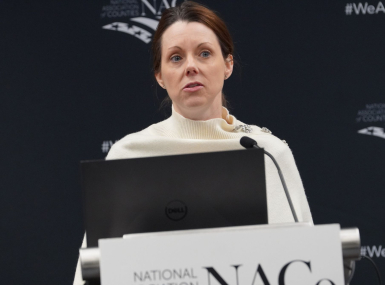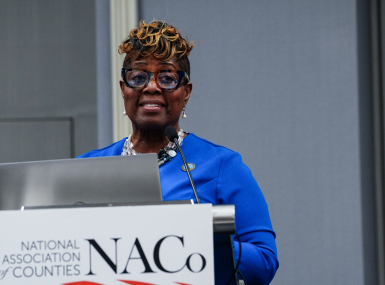When the public health emergency declaration ends, can flexibility for public assistance be retained?
Author
Upcoming Events
Related News

Key Takeaways
The public health emergency (PHE) declaration has been extended yet again, but when it does expire, can some of the flexibilities that helped vulnerable residents access public assistance be retained?
“I think we have proven you don’t need all that red tape,” Daniel Makelky, director of Human Services for Douglas County, Colo., told the Human Services and Education Policy Committee meeting July 21 at NACo’s Annual Conference.
Makelky, who is president of the National Association of County Human Services Administrators said that among the important actions resulting from the declaration was the waiver of the requirement for in-person interviews for assistance and the waiver of some forms of documentation of need.
Glenn Osborne, director of Social Services for Wilson County, N.C., urged county leaders to advocate for an extension of waivers. “We need more of those to remain. It gives our customers multiple ways of making applications” for assistance.
And, calling for a “common-sense approach,” Osborne asked “our federal partners” to consider standardizing requirements for various public assistance programs. “Why can’t we have one uniform standard?” he asked.
The public health emergency (PHE) declaration was originally made Jan. 31, 2020, by then-Secretary Alex M. Azar II, in response to the pandemic. The declaration has been renewed numerous times; most recently it was extended through Oct. 13 by current Secretary of Health and Human Services Xavier Becerra. HHS has committed to provide at least 60 days notice before any change.
Cheryl Ternes, director of Human Services for Arapahoe County, Colo., said at the meeting that although her county traditionally has a low level of poverty, it saw an increase in applications for assistance during the pandemic.
Waiving the requirement to document needs “has been huge,” she said. And “by not having to interview in-person, we have been able to process applications quicker, more efficiently.”
Now, Ternes said, her department is “hunkering down” in preparation for an end to emergency waivers. “We are working on communications to get information to folks. We are concerned about the impact.”
Joy Bivens, deputy county manager for Health and Human Services in Franklin County, Ohio, said the pandemic allowed her department to take a closer look at the services it offers, with the goal of making sure they are equitable.
“We have looked at ways to partner with other agencies. We have tried to be more innovative in our approach,” she said, including “taking services to the street” with mobile units.
Bivens urged county leaders to “invite other people to the table. We need communities to wrap around. It’s not just the government. It’s everyone.” She said she has spoken with members of the business community, telling them: “You need people to talk about food stamps in your business. They are not making enough” money.
Osborne also encouraged strengthening partnerships. “We’ve looked at what’s working well and built on that. Faith, business and community partnerships have worked well. I think we will be able to meet the challenge.”

Attachments
Related News

Federal-level child welfare priorities center on supporting foster youth, families
Child welfare experts outlined current priorities at the federal level, including better supporting foster care youth who age out of the system and recruiting more foster parents, at NACo’s Human Services and Education Policy Steering Committee meeting.

Prince William County transforms crisis care through "No Wrong Door" approach
Prince William County, Va.’s Crisis Receiving Center is bridging the gap between emergency room care and traditional outpatient care in behavioral crisis response and reducing burden on local law enforcement and hospitals.

House Agriculture Committee introduces 2026 Farm Bill
On February 13, House Agriculture Committee Chairman G.T. Thompson (R-Pa.-15) introduced the House version of the 2026 Farm Bill, the Farm, Food, and National Security Act of 2026.
